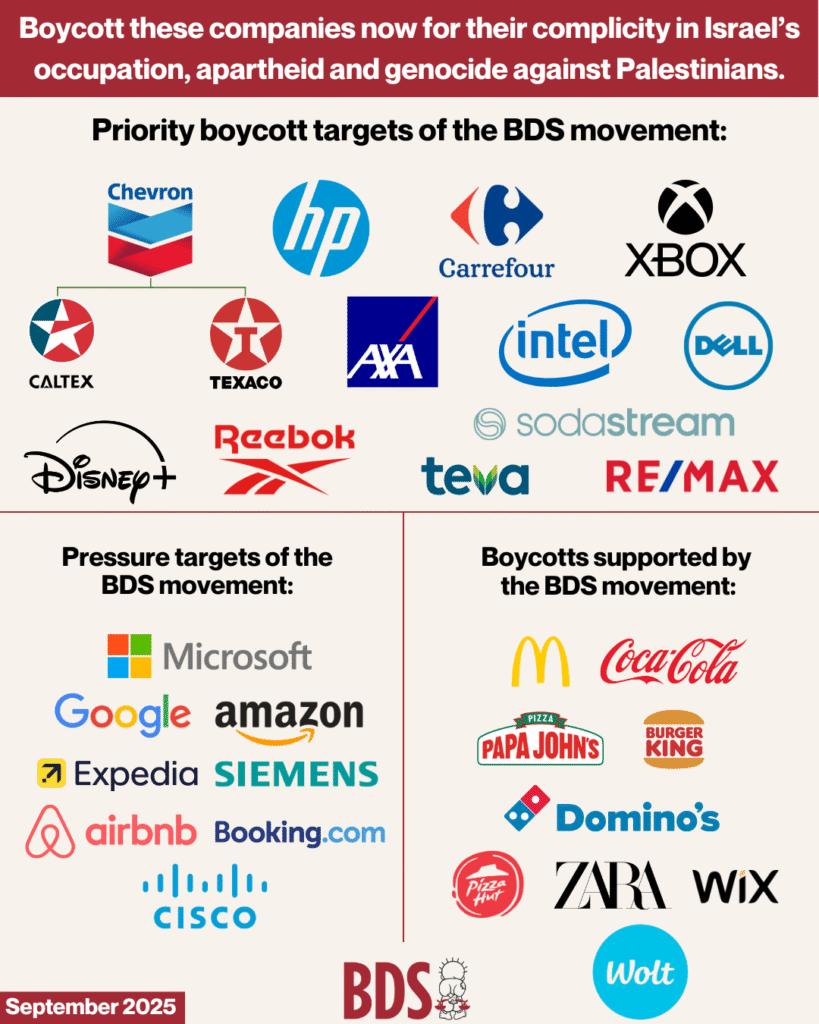BDS movement

Sumud’s BDS Finland working group shares information about the movement and its boycotts and organises various campaigns in Finland. Read more about the Apartheid Free Zone campaign, Israeli products out of shops campaign, Justice Not Arms campaign and Cultural and academic boycott.
Email: [email protected]
Instagram: @boikotoiapartheidia
Facebook: www.facebook.fi/bds.suomi
BDS is a global movement led by Palestinians that started in 2005 to peacefully cut off economic, political and cultural support to the apartheid Israeli government. BDS stands for boycott, divestment and sanctions. BDS is based on a simple principle: Palestinians have the same human rights as everyone else.
BDS is an inclusive, anti-racist human rights movement that opposes all forms of discrimination, including anti-Semitism and Islamophobia.
The BDS movement is inspired by the struggle against apartheid in South Africa and the boycotts that accompanied it. The BDS movement was launched by 170 Palestinian trade unions, refugee networks, women’s organisations, the Popular Solidarity Committee and other Palestinian civil society bodies.
Read more about the international BDS movement here.
The demands and objectives of the BDS movement
The Palestinians’ BDS calls for non-violent pressure on Israel until it complies with international law and meets three demands:
Boycotts, divestment and sanctions
BDS stands for boycott, divestment and sanctions.
Boycott
The aim of boycotts is to undermine the apartheid Israeli regime by denying it economic, political and social support, targeting businesses, sports, cultural and academic institutions that support Israeli human rights abuses.
Divestment
Banks, local governments, churches, pension funds, universities and other institutions are called upon to withdraw investments from the State of Israel and from all Israeli and international companies that support Israeli apartheid.
Sanctions
Governments are pressured to fulfil their legal obligations not to support and assist Israeli apartheid. Governments must ban business with Israel’s illegal settlements and stop arms sales and trade agreements.
What to boycott?
The BDS movement’s strategy is to target boycotts, pressure and sanctions at specific companies and products in order to maximize their impact. The BDS movement focuses on companies that have a clear and direct role in Israel’s war crimes and human rights abuses.
A targeted boycott can be used to influence the financial situation of a company. If a large proportion of consumers or stakeholders refrain from buying a company’s products or services, the company will be under financial pressure to change its operations. It can be challenging for a consumer to boycott thousands of different brands, so a targeted boycott also makes it easier to boycott every day. When everyone boycotts the same products, the impact is greater.
Targeted consumer boycotts have led retailers around the world to remove from sale products from companies that support and profit from Israeli crimes. Many Israeli exporters have complained that it has become more difficult to sell their products.
Targets are in three sections:

Consumer boycott targets
The BDS movement calls for a complete boycott of these brands carefully selected due to the company’s proven record of complicity in Israeli apartheid.
Organic boycott targets
These boycotts originated from collective action and have received support from the BDS movement. In Finland, Wolt has been chosen as a local boycott target.
Pressure targets
The BDS movement actively calls for pressure campaigns against these targets. This includes boycotts when reasonable alternatives exist, as well as lobbying, peaceful disruptions, and social media pressure.
Divestment & Exclusion from Contracts
Divestment & Exclusion from Contracts:
In addition to boycott and pressure targets, divestment and exclusion targets are indispensable in the BDS movement’s tools against complicit corporations. The BDS movement works to pressure governments, city councils, investment funds, institutions (including universities), trade unions, etc., to exclude from procurement contracts and investments as well as to divest from, as the case may be, as many complicit companies as practical, especially arms companies, tech companies, and financial institutions. We rely predominantly on the following authoritative sources and their research regarding divestment targets:
- AFSC list of companies that implicated in arming Israel’s #GazaGenocide.
- AFSC Investigate database of companies enabling the occupation.
- UN database of businesses involved in Israel’s illegal settlement enterprise.
- WhoProfits database of corporations profiting from the ongoing Israeli occupation.
- Don’t Buy Into Occupation list of businesses involved in the illegal Israeli settlement enterprise in the OPT in which European financial institutions have investments.
Learn more about divestments here: www.bdsmovement.net/Get-involved-divestment
Israeli Corporations & Banks
The BDS movement targets complicity, not identity. When it comes to Israeli companies, being non-complicit entails:
- Not being implicated in Israel’s military occupation, apartheid, or settler colonialism; and
- Publicly recognizing Palestinian rights under international law, primarily the right of refugees to return in accordance with UN resolution 194.
As far as we know, no Israeli company meets these two conditions. Accordingly, the BDS movement has called for boycotting and divesting from all Israeli companies unless they meet the above two conditions.